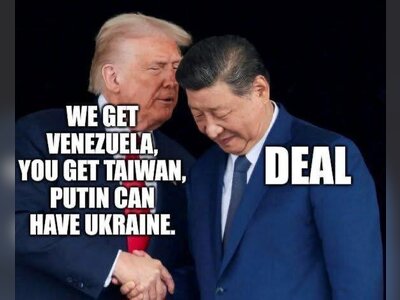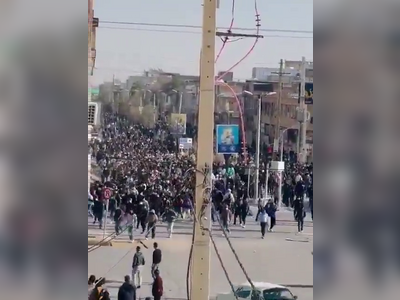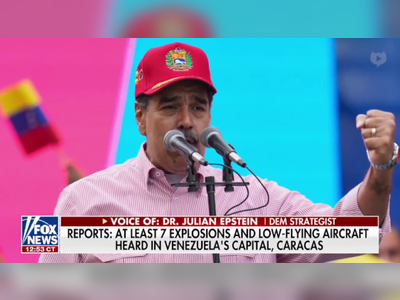Nvidia's founder refutes any participation in discussions regarding Intel's acquisition.
Jensen Huang Addresses Allegations Concerning Nvidia's Possible Involvement in Acquiring Intel's Chip Manufacturing Division.
Jensen Huang, the founder and CEO of Nvidia, refuted claims during the company's annual developer conference, asserting that Nvidia was not engaged in negotiations to take over Intel's chip manufacturing operations. He labeled the reports as incorrect, stating, "If there’s a party, nobody invited me."
Last week, Reuters reported that the Taiwanese semiconductor manufacturer TSMC was discussing with Nvidia, along with AMD and Broadcom, the possibility of forming a joint venture to manage Intel’s chip production amid the company's ongoing operational difficulties.
In response, Huang categorically dismissed the reports, commenting, "I don’t know where this came from. No one invited me to the party. Maybe others are involved, but not me."
Huang also spoke on the recent export restrictions on AI chips that were enacted by the Biden administration during its final days. These restrictions categorize countries into three tiers.
The first tier, encompassing the United States and 17 other nations, including Belgium, Canada, Australia, Denmark, France, Germany, and the UK, will face no export restrictions. Conversely, the third tier, which includes countries like China, Russia, Iran, and North Korea, will experience a full ban on AI chip exports.
The second tier includes 150 countries, such as Poland, Mexico, Israel, Singapore, and the United Arab Emirates, where AI chips can still be exported, albeit under specific computing power limitations.
When asked about these export control measures, Huang remarked, "In the long run, I believe AI is a technology essential for every country, industry, and company.
AI has already become mainstream. We discuss AI as though it’s some magical entity, but it really is just software. All nations will have the means to run software. If feasible, we would love to assist every country with American technology and standards. It’s beneficial for countries to access the computing resources they require, and it’s also beneficial for the United States."
On the subject of the Trump administration's tariffs and their influence on Nvidia, Huang indicated that the impact is expected to be minimal.
"We have a highly adaptable supply network. Not only in Taiwan, Mexico, or Vietnam, but in numerous locations. It’s a complex matter, depending on which countries are affected by the tariffs. Thus, in the short term, we don’t anticipate any substantial impact on our operations. In the long term, we aim to retain our flexibility through local production. By year-end, if we expand local production in our supply chain, our position will be quite solid. We possess the capacity to produce significantly in the U.S.—not everything, but a substantial amount."
Huang also discussed Nvidia's strategy for coping with the chip export prohibitions to China, which were instituted by the Biden administration in the fall of 2023. He stated, "We are fundamentally committed to operating our business legally and striving to compete and serve our customers. As the world becomes increasingly complex, we must adhere to the law and make every effort to meet the needs of our customers and markets. 50% of the world’s AI researchers are from China. The runner-up isn’t even close. This proximity suggests that there should be a major contribution to AI research from China. Every AI lab in the U.S. has many outstanding Chinese researchers, without exception. China produces numerous exceptional computer scientists, so please continue doing so."
Finally, Huang tackled the substantial energy demands involved in establishing data centers for AI model development. He contended that the dialogue around AI's energy consumption is misdirected. "AI is a new manufacturing sector. And manufacturing requires energy. The key question is whether a country wants to produce AI. If the answer is affirmative, energy is necessary. Among all the energy-consuming areas, what should be prioritized for production? Cement? Steel? Agriculture? AI? That’s a straightforward question."
Under Huang's leadership, Nvidia has further solidified its stature as a leader in the AI and GPU market. The company is acknowledged for its groundbreaking work in AI, deep learning, and high-performance computing. Huang's statements during the conference highlight the company's strategy for addressing global challenges, including navigating international relations, fostering technological innovation, and ensuring supply chain flexibility.
Nvidia’s emphasis on AI and machine learning has established it as a vital player in data center development, AI research, and high-performance computing. Huang's remarks highlight the necessity of sustaining a flexible, diversified supply chain and fostering global collaboration in AI research and development.
As the company navigates regulatory obstacles, including trade restrictions and export controls, it remains dedicated to expanding its technology and standards worldwide, ensuring access to computing power for countries and industries around the globe.
The company's vision for AI aligns with a future where nations and industries can fully leverage the potential of artificial intelligence while adeptly navigating the complexities of the global tech landscape.
Last week, Reuters reported that the Taiwanese semiconductor manufacturer TSMC was discussing with Nvidia, along with AMD and Broadcom, the possibility of forming a joint venture to manage Intel’s chip production amid the company's ongoing operational difficulties.
In response, Huang categorically dismissed the reports, commenting, "I don’t know where this came from. No one invited me to the party. Maybe others are involved, but not me."
Huang also spoke on the recent export restrictions on AI chips that were enacted by the Biden administration during its final days. These restrictions categorize countries into three tiers.
The first tier, encompassing the United States and 17 other nations, including Belgium, Canada, Australia, Denmark, France, Germany, and the UK, will face no export restrictions. Conversely, the third tier, which includes countries like China, Russia, Iran, and North Korea, will experience a full ban on AI chip exports.
The second tier includes 150 countries, such as Poland, Mexico, Israel, Singapore, and the United Arab Emirates, where AI chips can still be exported, albeit under specific computing power limitations.
When asked about these export control measures, Huang remarked, "In the long run, I believe AI is a technology essential for every country, industry, and company.
AI has already become mainstream. We discuss AI as though it’s some magical entity, but it really is just software. All nations will have the means to run software. If feasible, we would love to assist every country with American technology and standards. It’s beneficial for countries to access the computing resources they require, and it’s also beneficial for the United States."
On the subject of the Trump administration's tariffs and their influence on Nvidia, Huang indicated that the impact is expected to be minimal.
"We have a highly adaptable supply network. Not only in Taiwan, Mexico, or Vietnam, but in numerous locations. It’s a complex matter, depending on which countries are affected by the tariffs. Thus, in the short term, we don’t anticipate any substantial impact on our operations. In the long term, we aim to retain our flexibility through local production. By year-end, if we expand local production in our supply chain, our position will be quite solid. We possess the capacity to produce significantly in the U.S.—not everything, but a substantial amount."
Huang also discussed Nvidia's strategy for coping with the chip export prohibitions to China, which were instituted by the Biden administration in the fall of 2023. He stated, "We are fundamentally committed to operating our business legally and striving to compete and serve our customers. As the world becomes increasingly complex, we must adhere to the law and make every effort to meet the needs of our customers and markets. 50% of the world’s AI researchers are from China. The runner-up isn’t even close. This proximity suggests that there should be a major contribution to AI research from China. Every AI lab in the U.S. has many outstanding Chinese researchers, without exception. China produces numerous exceptional computer scientists, so please continue doing so."
Finally, Huang tackled the substantial energy demands involved in establishing data centers for AI model development. He contended that the dialogue around AI's energy consumption is misdirected. "AI is a new manufacturing sector. And manufacturing requires energy. The key question is whether a country wants to produce AI. If the answer is affirmative, energy is necessary. Among all the energy-consuming areas, what should be prioritized for production? Cement? Steel? Agriculture? AI? That’s a straightforward question."
Under Huang's leadership, Nvidia has further solidified its stature as a leader in the AI and GPU market. The company is acknowledged for its groundbreaking work in AI, deep learning, and high-performance computing. Huang's statements during the conference highlight the company's strategy for addressing global challenges, including navigating international relations, fostering technological innovation, and ensuring supply chain flexibility.
Nvidia’s emphasis on AI and machine learning has established it as a vital player in data center development, AI research, and high-performance computing. Huang's remarks highlight the necessity of sustaining a flexible, diversified supply chain and fostering global collaboration in AI research and development.
As the company navigates regulatory obstacles, including trade restrictions and export controls, it remains dedicated to expanding its technology and standards worldwide, ensuring access to computing power for countries and industries around the globe.
The company's vision for AI aligns with a future where nations and industries can fully leverage the potential of artificial intelligence while adeptly navigating the complexities of the global tech landscape.













